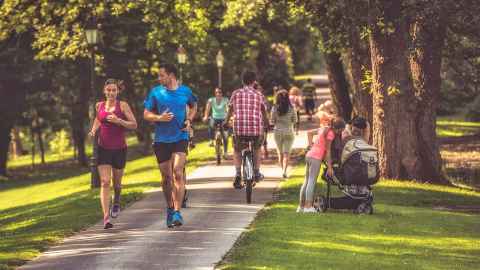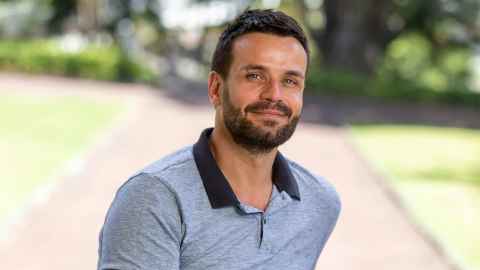7 tips to get in that daily exercise
24 May 2021
We get it. You're busy. But Dr David Moreau has 7 tips for getting daily exercise efficiently and creating a long-lasting impact on your brain and cognitive functions too.

Dr David Moreau is a cognitive neuroscientist in the Faculty of Science where he leads the Brain Dynamics Lab. Here are his 7 tips to get your daily exercise when free time is at a premium.
1. Have a routine
Although exercise has an immediate impact on the brain, short-term effects subside quickly. For its impact to last, exercise needs to be embedded within a routine, preferably daily or at least multiple times a week. Mornings work well for some; others prefer midday breaks or evenings. Time of day does not matter much – the most important thing is to implement a regular habit. After as little as a few weeks, tangible changes will appear, with a long-lasting impact on brain and cognitive functions.
2. Embrace diversity
Routine is key, but once established the downside is often lassitude. Exercise can become a drag and motivation hard to find. This is where the power of variety is key – having a number of options often makes for a routine you look forward to, rather than one that is dreaded. For example, online workouts provide great options to stay motivated when getting outside isn’t that enticing. More traditional outdoor alternatives can also help keep motivation intact; whether it is running, cycling, swimming, team sports or online workouts, make sure there’s enough variety to keep exercise fun and engaging no matter the circumstances.
3. Leverage HIT
One important new development in exercise research is the growing evidence for high-intensity training (HIT) as a way to maximise workout efficiency and profoundly impact the brain. Interleaving intense bursts of exercise (e.g. 20-30 seconds) with short periods of rest (30-40 seconds) allows for workouts that can not only be squeezed into a busy schedule, but also provides benefits on a par with those of longer forms of exercise. HIT is suited to indoor settings – with a virtual or in-person instructor – as well as outdoor environments. For example, try alternating sprints with recovery time throughout a Sunday run. As little as ten minutes a day for a few weeks is enough to see lasting physiological and cognitive benefits. Don’t hold back – pace it up!

One key element for exercise to have an even more profound impact on the brain is to make sure workouts are cognitively challenging.
4. Enrich your workout
One key element for exercise to have an even more profound impact on the brain is to make sure workouts are cognitively challenging. For example, activities that involve opponents and teammates force us to adapt to ever-changing environments in a process that is very beneficial to our brains. Challenges can also come from constraints you impose on yourself – from learning new workout routines to mastering new motor skills.
5. Measure your progress
New technologies such as smart watches and fitness trackers make it easy to gather information about yourself and your progress. This data can be very valuable to quantify the benefits of any exercise programme and maintain motivation over time. Watch your resting heart rate or your blood pressure going down as you commit to a programme, and witness the impact on weight or sleep quality too. These devices can also be handy when targeting specific exercise intensities (e.g. HIT) to make sure you stay within a pre-defined target zone.
6. Include others
Social interactions benefit the brain in numerous ways, through cognitively challenging and rewarding interactions. Exercise can be an excellent way to build a healthy social life, from regular meet-ups with workout buddies to new acquaintances and friends forged through team events. No matter the circumstances, the social aspect of exercise should not be overlooked – and group fitness classes often have online alternatives when going to a local gym is not an option.
7. Manage your recovery
Finally, the most important benefits of exercise are not immediate and require committing to a routine for a sustained period of time. To enable long-term commitment, it’s important to manage your rest and recovery. This includes sleep, of course, but not only. Make sure you schedule lighter sessions, including stretching and very low-intensity exercise, to facilitate long-term habits that are enjoyable and sustainable. With a focus on recovery comes a number of variables to attend to, from sleep to nutrition, mindfulness and relaxation. Ultimately, exercise can become the first step towards deeper personal care, and can encourage other holistic changes that have potent long-term effects.
This story first appeared in Ingenio Autumn 2021.
Email: ingenio@auckland.ac.nz